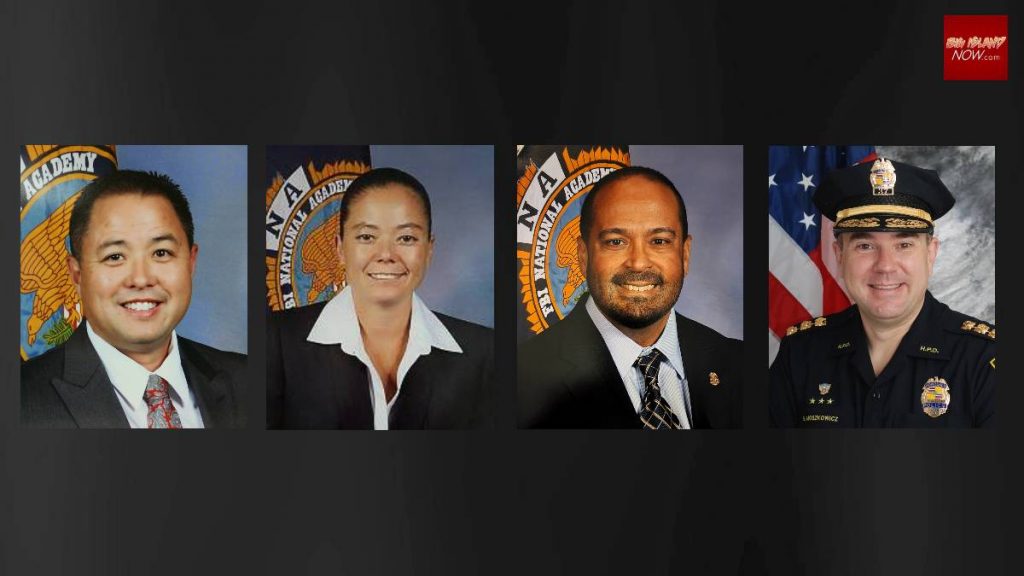Is hiring process for Hawaiʻi Police Chief transparent if 40 applicants remain anonymous?

The Hawai‘i County Police Commission Chair John Bertsch said transparency was paramount in the process to hire the next police chief. But while four finalists for the position are being interviewed at public meetings, it is unlikely the public will ever know the identities of the other 40 applicants.
“The HCPC [Hawai‘i County Police Commission] went through great lengths to say they had no knowledge as to the names of the applicants in the early stages and I have no evidence to the contrary, but why were their names shielded?” asked Sam Thomas, retired Hawai’i Police Department Assistant Chief of Operations, in a letter to the commission. “Why is the public not allowed to see if there was some ‘Super Star’ candidate that had not reached ‘final four’ status … and the reason for it?”
The Police Commission began its top cop search after Chief Paul Ferreira announced his retirement in June. Starting with a pool of 44 applicants, the number was whittled to 21 after candidates returned filled-out questionnaires. Bertsch said the applicants were known to the commission only by numbers to keep the process unbiased.
During closed-door sessions in November, the commission members discussed the remaining candidates — who were still known to them only by numbers.
After choosing five finalists, the commission members learned their names and on Dec. 6 publicly revealed the identities of four of the finalists — Paul N. Applegate, Sherry D. Bird, Edward G. Ignacio and Benjamin T. Moszkowicz. The fifth finalist withdrew.
The commission also heard public testimony in regards to the police chief appointment at two meetings in November and at two special meetings held this week, in which the four finalists were interviewed in public.
The commission will begin public deliberations Friday at 9 a.m. in the County Council Chambers in Hilo. To watch the meeting via Zoom, click here. The Meeting ID is 160 645 4115, and the Passcode is 627133.
The commission’s goal is to have a chief selected by the end of the year.
The commission told Big Island Now it can’t release the names of the 39 applicants who were passed over or the fifth finalist.
With the anonymity of the passed-over candidates, Thomas drew attention to the police rankings of the finalists.
Bird, the only internal finalist, is a major overseeing HPD’s Area II Field Operations Bureau. Applegate is a captain at the Kaua’i Police Department. Moszkowicz is a major within the Honolulu Police Department’s Traffic Division. Ignacio is a retired senior resident agent for the Federal Bureau of Investigation.
“The distance between Major and Police Chief is 3 promotional levels; the distance from Captain is 4; and the distance from a supervisory FBI agent is even greater,” Thomas said. “I understand some candidates may not have wanted to publicize their names in the early stages, but when aspiring for a position such as this, public scrutiny needs to be absolutely paramount.”
Hawai‘i County’s Human Resources Department claims they can’t release the names of the other 40 applicants for police chief because their applications are protected under the Uniform Information Practices Act. According to the act, it protects any government record.
“A job application to work for a government entity is a government document,” said the county’s Director of Human Resources Waylen Leopoldino.
Leopoldino said the commission asked his department to work with them on an unbiased application process. Through those conversations, questionnaires were developed for candidates. The returned, filled-out questionnaires were given applicant ID numbers.
“We guided commissioners to ensure the process is fair,” Leopoldino said.
The identity of each of the four finalists was released, but only if the finalist gave permission.
It’s unclear how finalists would have been interviewed at public meetings had they not given permission to reveal their identities.
Brian Black, Executive Director for the Civil Beat Law Center for the Public Interest, couldn’t say whether or not this practice of shielding government job applications was commonplace in the country. Each state has its own procedures and unique public records laws.
Black said the Uniform Information Practices Act as been interpreted by the Office of Information Practices to mean those applicants unsuccessful in applying for a government position have some form of privacy, however, that privacy has to be balanced with the public’s interest regarding the disclosure of the candidates’ identities.
Black had testified in the Nov. 18 meeting expressing his concern about the commission going into executive session to discuss the hiring of the police chief.
“I think the community would be interested in seeing how the commission is narrowing down the applicants,” Black said at the meeting via Zoom.
Mayor Mitch Roth said he doesn’t know who the other 40 applicants are either, adding: “I’d kind of like to know.”
While he sees the public interest in releasing the names of all the police chief applicants, Roth also said it could negatively impact someone’s job, prevent someone from putting in for the job, impact their willingness to do the job, and fear of retaliation.
Roth said he knows all of the candidates and has confidence that any one of the four chosen would make a good chief.
Commission Vice Chair Thomas Brown said the commission shares the same position regarding the privacy expectations of the non-finalist applicants.
“We will not disclose this confidential information,” Brown said. “In addition, we do not have signed releases or authorizations permitting such disclosure.”
However, Brown didn’t address whether or not there was public interest in releasing the names.
Sponsored Content
Comments





_1770333123096.webp)


